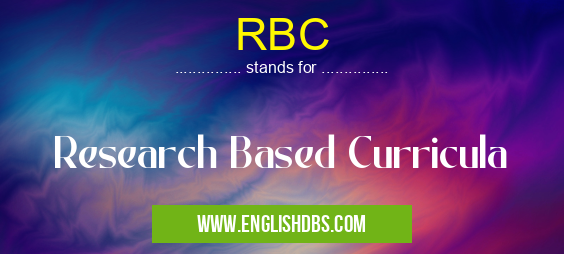What does RBC mean in RESEARCH
RBC stands for Research Based Curricula, an educational approach that emphasizes the integration of research and scholarship into teaching and learning. It involves the use of research-based methods, resources, and findings to enhance student learning outcomes.

RBC meaning in Research in Academic & Science
RBC mostly used in an acronym Research in Category Academic & Science that means Research Based Curricula
Shorthand: RBC,
Full Form: Research Based Curricula
For more information of "Research Based Curricula", see the section below.
Characteristics of RBC
- Emphasis on Research: RBC curricula prioritize research as a core component of student learning. Students actively engage in primary or secondary research, analyze data, and draw conclusions.
- Integration of Research and Teaching: Research is not treated as a separate activity but is seamlessly integrated into the teaching process. Students learn by doing research and applying their findings to real-world problems.
- Use of Evidence-Based Practices: RBC instructors rely on research-based practices to inform their teaching methods and materials. This ensures that students are exposed to the most effective and up-to-date educational approaches.
- Student-Centered Learning: RBC curricula emphasize student-centered learning, where students take an active role in their own learning. They have opportunities to design research projects, analyze data, and present their findings.
Benefits of RBC
- Enhanced Student Learning: RBC improves student learning outcomes by fostering critical thinking, problem-solving, and communication skills.
- Improved Teacher Effectiveness: By engaging in research, teachers stay abreast of best practices and are better equipped to meet the needs of their students.
- Connection to Real-World Problems: RBC connects students to real-world problems and issues, making learning more meaningful and relevant.
- Preparation for Higher Education and Careers: RBC curricula prepare students for success in higher education and careers that increasingly require research skills and critical thinking abilities.
Implementation of RBC
Implementing RBC requires careful planning and support. It involves:
- Establishing a research-supportive culture within the institution
- Providing professional development opportunities for teachers
- Ensuring access to research resources and databases
- Integrating research into course content and assignments
Essential Questions and Answers on Research Based Curricula in "SCIENCE»RESEARCH"
What is RBC (Research-Based Curricula)?
RBC is an educational approach that utilizes research findings and evidence-based practices to develop and deliver curricula. It ensures that students are learning the most up-to-date and effective content and skills, supported by rigorous research.
What are the benefits of RBC?
RBC provides several benefits:
- Improved student learning outcomes: By incorporating research-based methods, RBC enhances student engagement, comprehension, and critical thinking skills.
- Enhanced teacher effectiveness: RBC equips teachers with evidence-based strategies and resources to improve their teaching practices.
- Alignment with educational standards: RBC ensures alignment with established educational standards, ensuring students are prepared for higher education and the workforce.
- Data-driven decision-making: RBC promotes ongoing data collection and analysis to inform curriculum development and instruction, leading to continuous improvement.
How is RBC implemented in the classroom?
RBC is implemented through various approaches:
- Integration of research findings: Teachers incorporate relevant research into lesson plans and classroom activities.
- Use of evidence-based resources: Students engage with textbooks, articles, and online materials that present research-based content and practices.
- Collaborative planning: Educators work together to design curricula that align with research and best practices.
- Professional development: Teachers participate in workshops and professional development opportunities to enhance their understanding and implementation of RBC.
What role does research play in RBC?
Research is the cornerstone of RBC. It provides the foundation for:
- Curriculum development: Research informs the selection of content, teaching strategies, and assessment methods.
- Instructional decision-making: Teachers use research to make informed choices about how to present information, engage students, and monitor progress.
- Evaluation and improvement: Research helps evaluate the effectiveness of RBC and identify areas for improvement.
Final Words: Research Based Curricula (RBC) is a transformative educational approach that enhances student learning, improves teacher effectiveness, and prepares students for the future. By integrating research into teaching and learning, RBC curricula empower students with the skills and knowledge necessary to succeed in a rapidly changing world.
RBC also stands for: |
|
| All stands for RBC |
